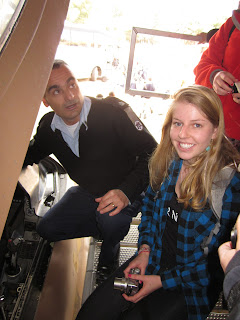I woke up thinking it might have been a dream. An entire trip to Israel, come and gone in what feels like the blink of an eye and a lifetime. Then I took out my notebook, only to find the IDF Air Force pendant given to me by Sharon, one of the Israeli participants. Turns out it wasn't dream after all.
A week and a half of discovery. We took in so many sights that my head is spinning. we ate such great food that filled my stomach with delight, we walked so much that my feet hurt, and we got to know each other better than anyone could have ever expected.
I cannot say that I have a truly favorite moment - so many stand out. From taking in the view in the Golan Heights, to dinner on Tiberius' shore, to riding camels, climbing rocks in the Negev and going to two different IDF bases, this trip not only provided an opportunity to experience Israel, but to experience several facets of Israel.
I'll speak about Masada, because that, for me, might be the real high point of Birthright. At 6am we anxiously gathered outside, in the cold semi-dark base of the mountain. Eagerly we ascended, bumping into each other along the way. At the summit we stopped and began to watch a miracle. I've always had an affinity for sunrises, but a sunrise shared with fifty peers, over a glittering pool of water from Masada's beautiful vantage point? I will remember this for life.
Of course, often times it is the company you are with, and not the venue itself that makes a moment memorable. In this case, both the place and the people made all eleven days special. Our walks through the cities of Jerusalem, Tzvat, Tel Aviv, Haifa and Jaffa were opportunities to get to know each other while simultaneously sight-seeing a land not our own. During these walks, the Israelis might talk about the last time they were in some city, or we would be discussing the differences between American and Israeli culture - although it turns out we have much more in common. We had so little time to exchange lives and information, but we used what time we had to the best of our abilities. I remember walking along the beach, learning Hebrew words and taking in the fresh air.
I could go on for days and days, naming every little nook and cranny of our experience, but such long and stretched out descriptions would not do any of it justice. In eleven days, a group of 42 Americans and 9 Israelis discovered the bonds of friendship, of laughter, of tranquility in nature, and of the Jewish nation. What did we have in common? Judaism. Some of us are religious, some aren't. What did we come together over? The smiles. Eleven days created for me a lifelong connection to the land of Israel. I've been touched not only by its physical beauty, but also by the beauty of its people. Eleven days can go by very fast - so fast you can't stop to think about all the wonderful times you're having.
For me, I'm just glad those eleven days were real, but if they were a dream, then they are the best dream I ever had.
-Mitch Mosk '14





















